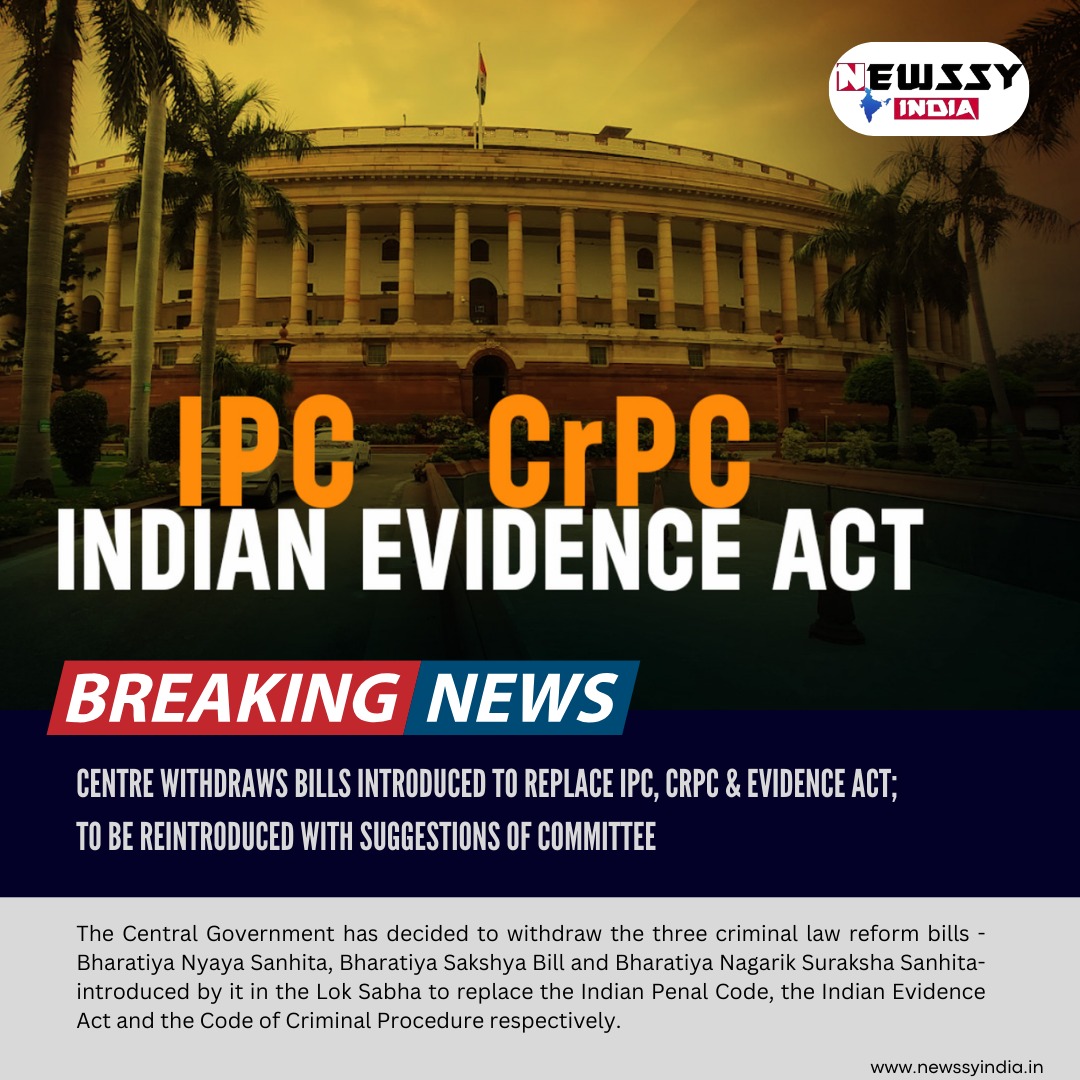In a surprising move, the Central Government has decided to withdraw the three criminal law reform bills it introduced in the Lok Sabha just a few months ago. These bills, namely the Bharatiya Nyaya Sanhita (BNS), the Bharatiya Nagarik Suraksha Sanhita (BNSS), and the Bharatiya Sakshya Bill (BS), aimed to replace the Indian Penal Code (IPC), the Code of Criminal Procedure (CrPC), and the Indian Evidence Act (IEA) respectively.
The withdrawal of these bills has sparked a flurry of reactions and interpretations. While some see it as a setback for the government’s ambitious legal reforms agenda, others believe it’s a prudent move to ensure comprehensive and inclusive legislation.
Reasons for Withdrawal:
The official reason cited by the government for withdrawing the bills is the need to incorporate suggestions and recommendations from a standing committee of parliament. The committee, tasked with scrutinizing the bills, had received over 10,000 suggestions from various stakeholders, including legal experts, civil society organizations, and individuals.
Given the volume and complexity of these suggestions, the government deemed it necessary to withdraw the bills and allow for a more thorough review and incorporation of the committee’s recommendations. This move indicates the government’s willingness to prioritize a deliberative approach to legal reform, ensuring that the concerns and perspectives of various stakeholders are heard and addressed.
Potential Implications:
The withdrawal of the bills is likely to have several implications:
Delayed Implementation: The revised timeline for the implementation of the new legal framework remains unclear. The government has indicated that the bills will be reintroduced after incorporating the committee’s suggestions. However, the exact timeframe for this process remains to be determined.
Uncertainty and Confusion: The withdrawal may create uncertainty and confusion among legal practitioners, law enforcement agencies, and the general public. The existing legal framework, which has been in place for decades, may continue to be used for a longer period, potentially leading to inconsistencies and challenges in application.
Renewed Public Debate: The withdrawal is likely to reignite public debate on the proposed reforms. The committee’s recommendations and the revised versions of the bills will be subject to further scrutiny and analysis by various stakeholders. This open discourse can be beneficial in shaping a more nuanced and robust legal framework.
Way Forward:
The government’s decision to withdraw the bills has opened up a new opportunity for constructive dialogue and collaboration. The following steps can be crucial in ensuring the successful reintroduction and implementation of the revised legal framework:
Transparency and Public Engagement: The government must be transparent about the process of incorporating the committee’s recommendations and revising the bills. Public engagement through consultations, workshops, and open forums should be encouraged to ensure diverse perspectives are considered.
Expert Analysis and Scrutiny: Legal experts, civil society organizations, and academic institutions should be invited to provide detailed analysis and feedback on the revised bills. This will help identify potential flaws and ensure the legal framework is sound and comprehensive.
Focus on Addressing Concerns: The revised bills should prioritize addressing the specific concerns raised by stakeholders during the committee’s review process. This could involve incorporating safeguards against misuse of the law, ensuring clarity in definitions, and addressing potential procedural complexities.
The Centre’s withdrawal of the criminal law reform bills presents an opportunity to reflect on the complexities of legal reform and reiterate the importance of a collaborative approach. By incorporating valuable feedback and prioritizing public engagement, the government can ensure the reintroduction of a legal framework that meets the aspirations of justice, fairness, and inclusivity.








